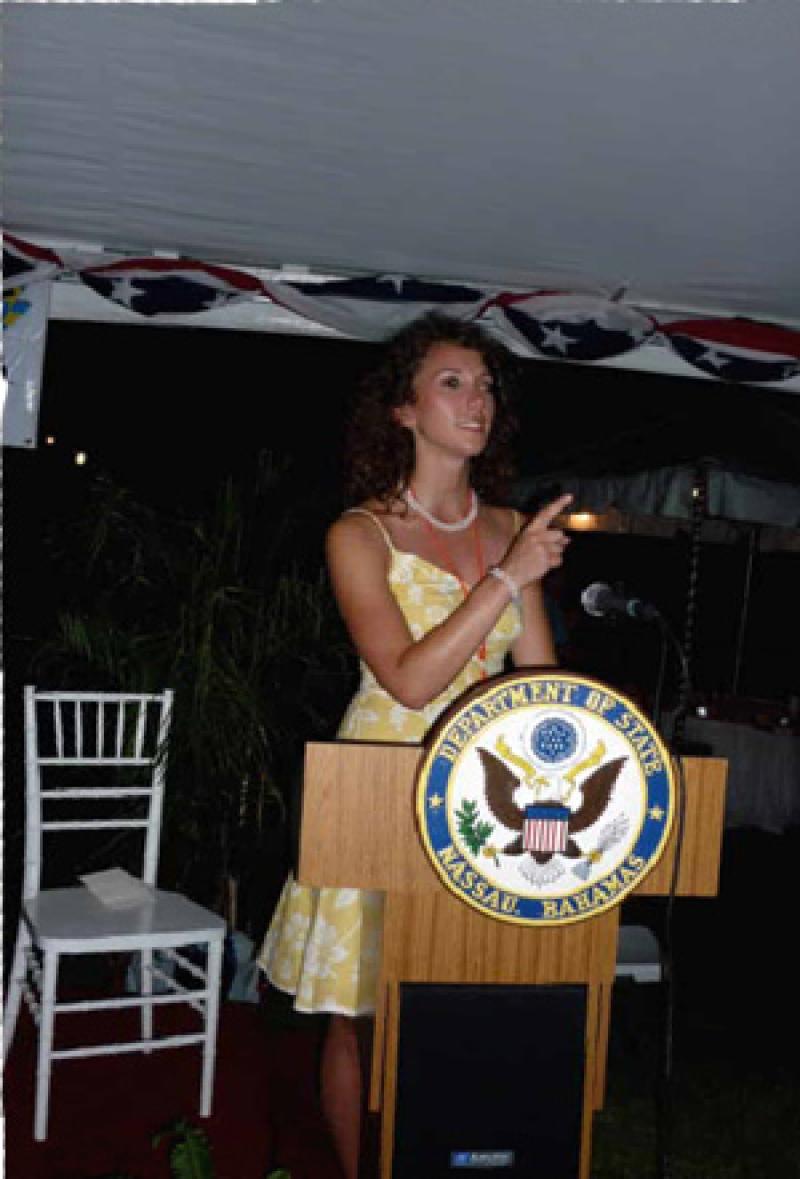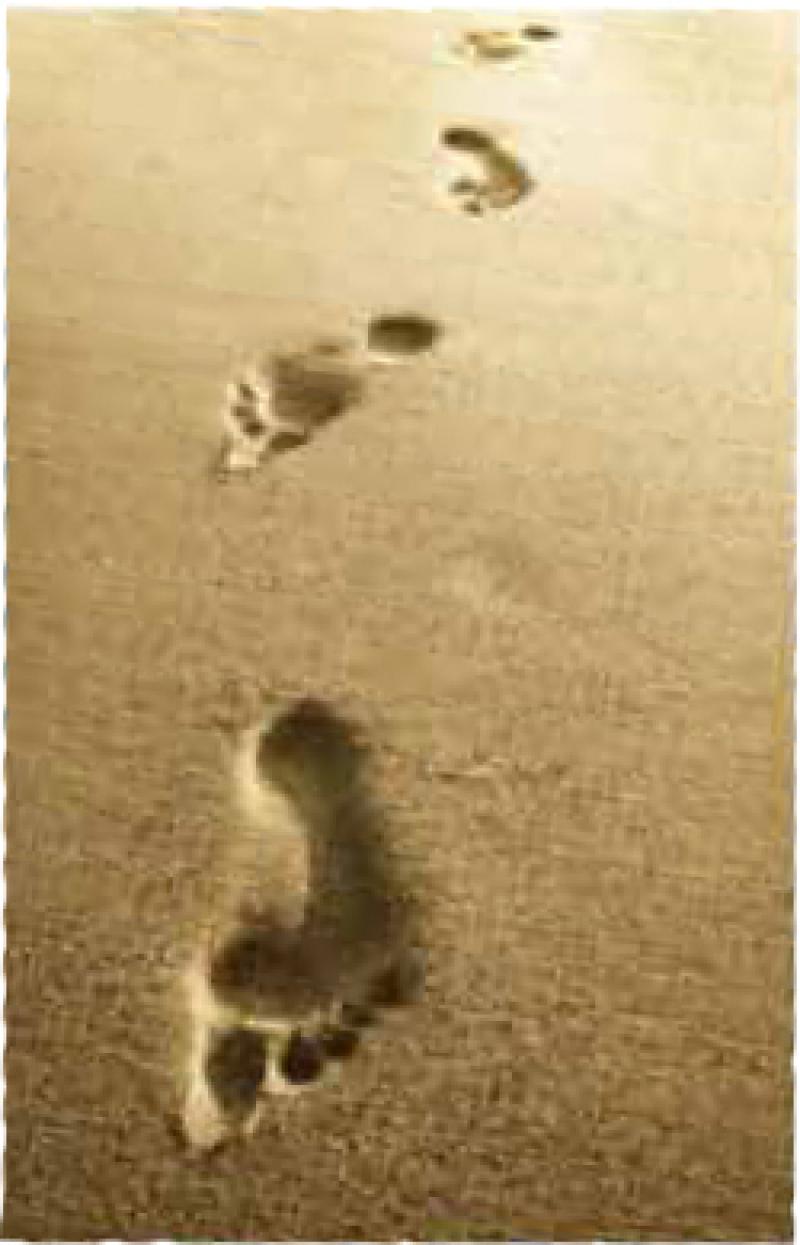Putting Shoes on the "Barefoot Bandit": Stories from my State Department Internship in the Bahamas
Erica Sayers

The more I thought about the actual work, however, the more I had doubts on the substance of the internship. I became fazed by the fact that I was not working in a major embassy like Paris or traveling a great distance to a place like Tanzania. I didn't have any information on the cone, or section, of the Embassy I was to work in, Consular. I received an email saying I may work on visa fraud prevention, I may help perform American Citizen Services, or I may encounter immigration law. I was extremely excited to start the internship, but I arrived with only a general idea of what I was about to do and a few doubts on the importance of the post.
Needless to say, these were simply prearrival anxieties that were quickly shed once I got to know the U.S. Embassy in Nassau and the Consular Section in general. I dove head first into the U.S. State Department world and scrambled to keep up with the endless acronyms, positions, and roles of the people and cones of the Embassy. On the first day, the DCM, or Deputy Chief of Mission, took me into his office to explain that American relations with the Bahamas were very strategic in terms of defense. This explained why I noticed a heavy Coast Guard and Naval presence. There is also one of only two United States Customs and Border Patrol posts at the airport that clears a traveler through US Customs before they land on US soil. The only other one in the world is in Ireland. There are about 15 different branches of the United States government in the Bahamas and the Turks and Caicos, and the section that I was working in was doubtlessly one of the most important in the region.

I was given a desk with all of the Foreign Service Officers, though they were rarely at them. Immediately I recognized that the Consular Section was not a typical office job. I did everything that they could throw at me, but most of my duties were involved with American Citizen Services. The hurricane season was upon the Bahamas, and it was my responsibility to communicate with American Wardens to ensure hurricane preparedness. American Wardens are American citizens who live in the consular district and agree to aide the Embassy in emergency situations, like a hurricane. When the communication lines are down, it would be hard for FSOs in Nassau to reach a remote island to make sure that American citizens are okay and have adequate supplies. I talked to them and updated them every week, and they would consult me with their hurricane questions.
I was constantly running between the court, the jail, the prison, or even the morgue when American citizens got themselves into trouble. I authored reports on these visits and provided amenities to those who required them. Sometimes I brought them magazines and journals to write in, other times I brought clothes that had been sent to them from family members via the Embassy. When visiting those in prison, it was my duty to inquire about their humanitarian treatment from the Bahamian prison staff. For example, if a prisoner was not getting the correct medicine or the adequate dosage, the US Embassy could obtain a copy of the prisoners medical records from lawyers in the US and pressure the Bahamian prison to adhere to the American doctors orders. This was just one of the many stories I encountered at the Bahamian prison.
One day I had to go to the morgue to identify the body of a diver who drowned. She didn't have any family in the Bahamas to expedite the funeral process, so we confirmed her identity based on the passport photos we had in our files.
Out of all of the American Citizen Services excursions I went on, one day in particular stood out. It was a Tuesday morning after the Bahamian Independence weekend, and we did not have work on that Monday. I walked in to the office and my boss immediately assigned me to go shopping for an American citizen who was to have a court hearing that morning and needed presentable clothes and shoes.
Over the weekend a teenaged outlaw stole a private plane in Indiana and flew it all the way to the Bahamas, crash landing in some of the outer islands. Colton Harris-Moore, otherwise known as "the Barefoot Bandit," had been wanted by the FBI for two years for stealing at least five private aircraft, a few cars, and a boat, along with many household burglaries. In the two years that Harris-Moore was running from the authorities (he began at age 17), he made it from an island off of the coast of the Pacific Northwest all the way to a little island in the Bahamas.
I headed off in search of appropriate clothing for Mr. Harris-Moore to wear to his hearing at noon that day, and it proved to be quite hard to find anything suitable in touristy downtown Nassau for a young adult to wear to court. I settled on some black board shorts, the least conspicuous "Nassau, Bahamas" shirt I could find, and some grey water shoes, because those were the only type of shoe I could find in a size 14. The Barefoot Bandit had big feet, and I shoed them. After passing the items along to my boss for him to deliver, I went straight to the courthouse to watch the hearing. Because there were so many members of the press dying to get a word from a member of the US Embassy, I waited in the magistrate's office. I had strict orders to say "No comment" when the reporters from CNN, NBC, MSNBC, and other nightly news channels approached me for a comment.
Mr. Harris-Moore was charged on one count—illegal landing in the Bahamas— and ordered deported immediately after either paying a fine of $300 dollars or serving a 3-month sentence. Because he had no money, the American Citizen Services section was able to issue a temporary loan (available to any destitute American) for him to pay this fine. After reporting back to the office, I accompanied my superior to the jail to have him sign a promissory note for the repayment of this loan. He was tall, lanky, and a little bit socially awkward when asked how many Facebook fans he had. The FBI Marshalls were already in place to deport him, and we hurried to the airport with the Bahamian authorities as they put him on the flight headed back to the US. We waited until the airplane's wheels were up to relax, and the day of the Barefoot Bandit was over.
I was also lucky enough to be interning at the Embassy over the Fourth of July. I was assigned as the entertainment assistant for the Ambassador's July Fourth Celebration. This meant that I was to coordinate the transitions of four bands on and off stage for three hours, cater to the needs of the artists, and organize backstage security at the Ambassador's residence. The Ambassador to the Bahamas, Nicole Avant, is one of the few politically appointed ambassadors in the world. She was the head of Obama's fundraising in the southern half of California, and was able to raise a lot of money because she has many connections in the music industry. Because of these connections, the headliner of the celebration and one of the artists I was assisting was R&B singer India Arie, along with two local bands and the Rhode Island Brass Band. The show went smoothly and it was a beautiful party. I even spent some of the morning on the radio promoting the party and discussing life at the Embassy.
Another large part of my job was working with immigration law and the US laws of visa issuance. I had the opportunity to interpret Bahamian law and provide legal analysis for the FSOs when they came across Bahamian Non-Immigrant Visa applicants who had a criminal record. There are certain crimes that, if one has a record of them, prevent an applicant from receiving a visa for entry to the United States. Even though only Foreign Service Officers could perform the actual visa interviews, they all drew me into the process by consulting me on questionable charges.
Everyone in the Embassy that I encountered and worked with was extremely helpful and welcoming to me, and they definitely took my experience from great to amazing. There were many Bahamian workers in my office, and I had the opportunity to get to know the local culture well. I celebrated the Bahamian Independence Day with them and watched the Junkanoo parade, which runs from 2 am to 6 am in the morning! The FSOs were extremely friendly and always willing to give advice and share their story of how they ended up in the State Department. I had an insider's look at the life of a Foreign Service Officer.
To become a Foreign Service Officer is no easy, single interview process. One must pass three tough exams in order to be considered. After passing, then you must obtain a Top Secret Security Clearance by passing a rigorous background check. Once all of these steps are finished, you spend a year training at the Foreign Service Institute before you can expect to get the job and post assignment. If you're willing and able to do these things, you will be rewarded with one of the most interesting jobs in the world.
When I started the International Studies major at Ohio State, the only thing I was sure of was that I wanted to go to law school. I chose the major because I was interested in all of the classes it had to offer, and I didn't consider careers out of it. My experiences at the U.S. Embassy in Nassau, the Bahamas, have shown me that the International Studies program is a perfect preparation and tactical training for a career as a Foreign Service Officer in the US State Department. The program is special because it fosters interest in Foreign Service work while encouraging students to think for themselves in an everchanging world. You can make the major what you want it to be, but you just have to put in the time, effort, and passion to make it yours. I was discouraged when I was not offered an internship from the State Department the first time I applied, but it only gave me reasons to get more involved with my community and apply again with a stronger resume. After spending the summer in the Bahamas and getting to know the culture of both the islands and the Embassy community, there is no other place I would have rather lived this intern experience."
